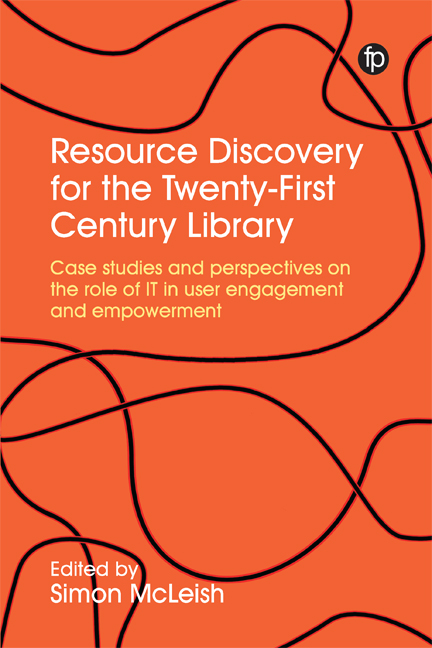Book contents
- Frontmatter
- Contents
- Figures and Tables
- Contributors
- Foreword: Library Discovery Directions
- 1 Introduction: Technology and Resource Discovery
- 2 Flipping the Catalogue: Taking Resource Discovery to the Next Level
- 3 Breaking the Record: Liberating Data into Knowledge at the National Library Board of Singapore
- 4 Case Study: Clearing Library Discovery-to-Access Pathways for IEEE Content
- 5 Case Study: Putting Discovery at the Heart of the Library Experience
- 6 Investigating Resource Discovery Needs at the University of Oxford
- 7 ‘Why Can’t you Just Use Google?’
- 8 Exposing Collections and Resources Effectively
- 9 Open Source Discovery using Blacklight at the University of Hull
- 10 A World of Curated Knowledge: Leveraging the Wider Semantic Web to Enhance Library Discovery
- 11 Cultural Discovery: Trends and Futures
- 12 Discovering the Future
- Editorial Afterword
- Index
11 - Cultural Discovery: Trends and Futures
Published online by Cambridge University Press: 23 July 2020
- Frontmatter
- Contents
- Figures and Tables
- Contributors
- Foreword: Library Discovery Directions
- 1 Introduction: Technology and Resource Discovery
- 2 Flipping the Catalogue: Taking Resource Discovery to the Next Level
- 3 Breaking the Record: Liberating Data into Knowledge at the National Library Board of Singapore
- 4 Case Study: Clearing Library Discovery-to-Access Pathways for IEEE Content
- 5 Case Study: Putting Discovery at the Heart of the Library Experience
- 6 Investigating Resource Discovery Needs at the University of Oxford
- 7 ‘Why Can’t you Just Use Google?’
- 8 Exposing Collections and Resources Effectively
- 9 Open Source Discovery using Blacklight at the University of Hull
- 10 A World of Curated Knowledge: Leveraging the Wider Semantic Web to Enhance Library Discovery
- 11 Cultural Discovery: Trends and Futures
- 12 Discovering the Future
- Editorial Afterword
- Index
Summary
Introduction
It is well established already that ‘discovery … happens elsewhere’ (Dempsey, 2016) only sometimes, if ever, taking place within the walls – physical or virtual – of a traditional cultural memory institution (library, archive, museum, etc.).
Individuals’ knowledge journeys, characterised only at times by explicit ‘information seeking’, are diverse, in the content sought and valued, and the discovery environment and search strategies employed. As digital technologies increase in power and sophistication, the design of tools and services takes an ever more subtle and nuanced account of user intention and behaviour, and the networked world makes it faster and easier to forge connections between individuals and information.
The downside of these advances is an ever increasing volume of information available globally and within specific communities or disciplines, and a diminishing understanding of the layers of mediation between an individual and the information they seek and consume. At the most basic level there is a common lack of understanding of the ways in which information is created, encoded, transmitted, preserved and retrieved, and a separation between individuals and the tools or technologies at their disposal to structure and navigate their information environment.
The most exciting example of technological progression is the advance in machine learning, which ‘gives computers the ability to learn without being explicitly programmed’ (Wikipedia, n.d.). Essentially, rather than simply following rules deterministically to solve a problem, machines are gaining the ability to determine rules for themselves. Previously, a machine was given data and rules, and produced answers. Now, machines can be given data and answers, and produce rules – which can then be applied to new data to produce new answers.
In the realm of discovery, this leads to an epochal shift in information retrieval, whereby machines can extract knowledge from documents (and other multimedia sources), and enable users to navigate knowledge graphs rather than lists of documents which they have to read themselves to understand. Knowledge graphs encode relationships between concepts, introducing more sophistication than the familiar citation graph (citations or cited-by links in article databases) to express any meaningful relationship between concepts. In this paradigm, users don't even need to know the question – machines can begin to uncover both known and currently unknown relationships, and open up new connections and hypotheses for exploration.
- Type
- Chapter
- Information
- Resource Discovery for the Twenty-First Century Library , pp. 161 - 176Publisher: FacetPrint publication year: 2020



